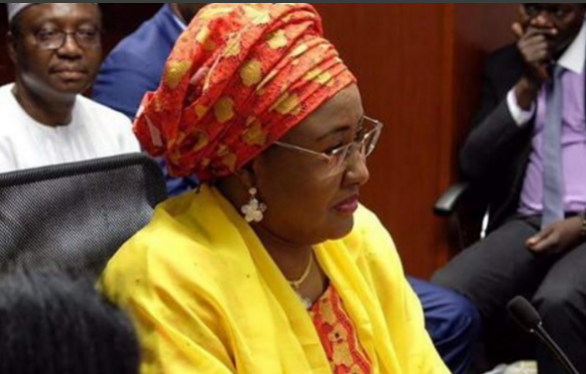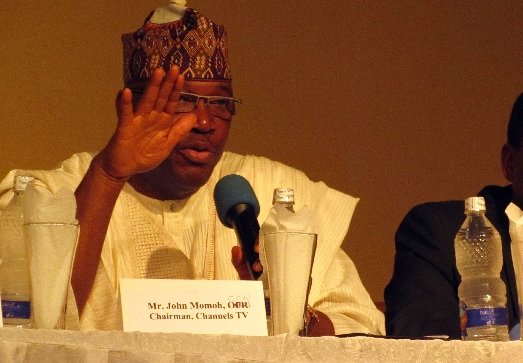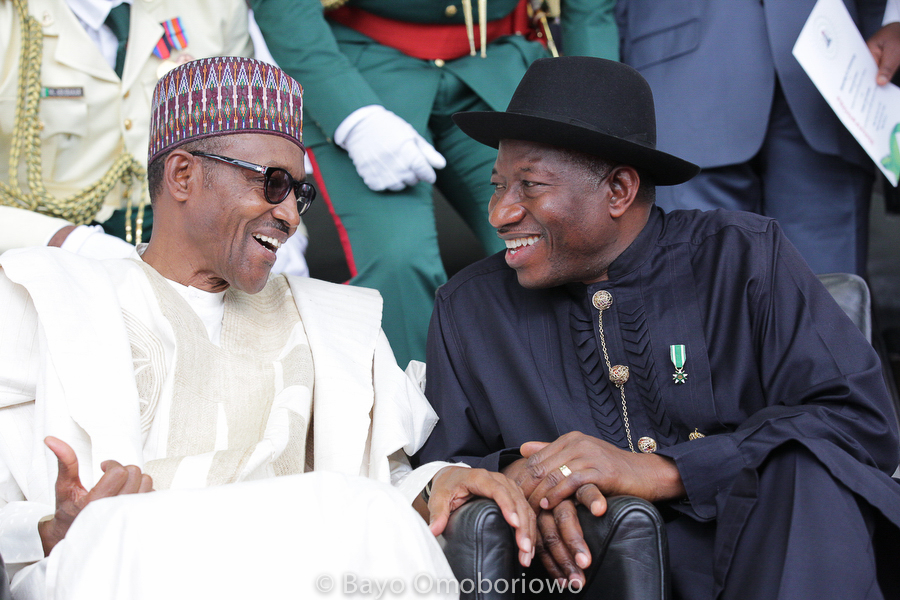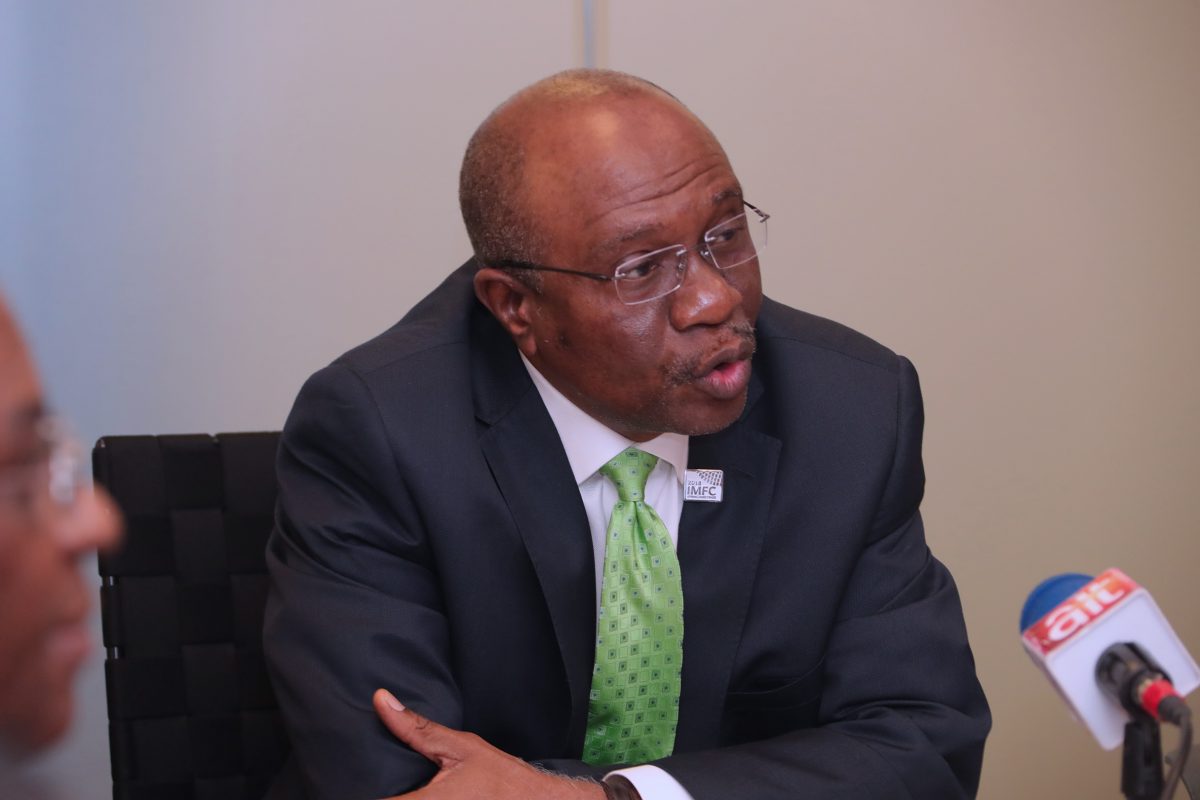Weird, unusual and a clear contradiction of the mannerisms of the class she belongs, events are fast proving that the persona of Nigeria’s First Lady, Aishat Buhari and the driving force of her clear departure from the norm, certainly need looking into. Weird, no doubt, Aishat isn’t the first queer First Lady in the world.
Is she a destructive female, bent on destroying her husband, what the French call the femme fatale? The femme fataleis an archetype of literature and art referring to a mysterious and seductive woman whose charms and deploying of her feminine wiles ensnare the collective in dangerous and deadly situations, all geared towards achieving hidden purposes. The femme fatale may also be a victim who is trapped in a deadly situation that is beyond her, example being the 1947 film entitled The Lady from Shanghai.
Mrs. Buhari’s weirdness finds fitting similarity in Mary Todd Lincoln, wife of American lawyer and politician who later became the 16th President of the United States of America, between 1861, until his assassination in April 1865. Todd was what is called a proto-feminist and religious radical. Her views were weird, even for America of her age, curried with a manifest protest politics stance which smelled of deep scents of occultism. Her acts as First Lady made very seismic impact on the American nation.
A few months after arriving the White House in March, 1861 as President and First Lady, the Lincolns’ first nightmare which many mid-century parents equally encountered, became the lot of the First Family. Willie, their 11-year-old son, had become afflicted by a serious fever. Willie was on record to be very sensitive and “precociously religious” and was the couple’s favorite. Not minding the weeks of vigils and trauma of the family, Willie gave up the ghost one afternoon in February, 1862. Todd as a person was acutely traumatized. This made her, like the troubled biblical King Saul, to turn to the spiritualism of trance mediums which she began to frequent, desperately believing that they could help her set up spiritual contact with her child. True to her expectation, one day, according to her biographer, Carl Sandburg, Todd rushed to the room of her half-sister and exclaimed, “He lives, Emilie! He comes to me every night and stands at the foot of my bed, with the same sweet, adorable smile he always had.”
Advertisement
Todd’s spiritual consultation of mediums became so embarrassing that in 1875, her only surviving son, Robert, got her locked up in a sanitarium. Three years earlier, and exactly seven years after Lincoln, her husband, was assassinated, specifically in February 1872, both the New York Times and the Boston Herald subjected her to intense incendiary articles which claimed that this widow obliquely sought services of Margaret Fox, an American notorious medium and was squandering her inherited estate on the spiritualist. On July 16, 1882, the earthly toil ended for Todd Lincoln. She died dejected by the betrayal of an American nation which killed her husband, a son who committed her to a psychiatric hospital and an American press which labeled her as deranged.
Neither could Aisha be weirder than Dolly Madison, wife of James Madison, President of the United States between 1809 and 1817. Dolly turned the White House to shindigs every week, inviting everyone: celebrities, politicians and shoemakers on the streets. She also capped this up by dressing provocatively. She was recorded to have made a departure from the norm by uniting her husband’s political rivals to these shindigs, thereby uniting the political parties
Two statements underneath, one from a fictitious character in a book of literature and the other made by Aishat herself, share some similarities in the advocacies behind their outbursts. They should provoke an in-depth study of the reasoning behind them. The statements both query the masculinity of the male gender and the potency of his manhood in righting wrongs. The first was, “Lord, you call yourselves men, you poltroons! You let a small ruffian insult you. Fancy, he grabs at a girl in front of you – might be your daughter – this thing with the manner of a pig! If there were real men here, they’d pull his pants off and give him such a leathering he’d never sit down for a week. But, no, you let him do this here; tonight you’ll let him do it in your homes. And all you do is whimper.” The second was, “Where are the men of Nigeria? Where are the Nigerian men? What are you doing? Instead of them to come together and fight them, they kept visiting them one after the other, licking their shoes. I am sorry to use that word.”
Advertisement
While the first was an unnamed woman in a South African train incensed by a tout attempting to assault a young girl and by so doing, debasing her womanity, the second was made by Mrs. Buhari last week at a national leadership summit for women organized by a political group, Project 4+4 for Buhari & Osinbajo 2019. The two outbursts are however united by an uncommon activism that is geared towards righting wrongs. While the unnamed woman, cited in a South African book of short stories, like a typical African woman, was riled by contemporary disregard by a male-dominated society for the person of the female gender, Mrs. Buhari was provoked by what she perceives as an unfair power equation which has tilted power away from the people of Nigeria.
There is however a deeper need for an examination of the persona of the character called Aishat, wife of the President of the Federal Republic of Nigeria. Since arriving Aso Villa with her husband the President, Mrs. Buhari has carved a renown for herself for her fiery public rebukes of her husband’s government. At the most recent event, she had said that although over 15 million Nigerians voted for Buhari in 2015, two persons have taken over the reins of that government. “Our votes were over 15 million in the last election, and after that, only for us to be dominated by two people. That hinders collective team work that we started, which is totally unacceptable,” she had said, and continuing, exploded: “If 15.4 million people can bring in a government, and only for the government to be dominated by two people; where are the men of Nigeria?” She also critiqued the slow start of the government, pillorying achievements of the Buhari government at this last minute of the administration.
On Monday, October 9, 2017, Mrs. Buhari had tongue-lashed the presidency for its sparse commitment to the healthcare of the people, basing this on the management of Aso Rock clinic. The clinic, she had said, lacked facilities to treat patients and claimed that, after she found that the clinic’s x-ray machine was not working, she had to resort to the services of a private clinic.
Barely two years after the life of the administration, the First Lady again shocked Nigerians when she announced on the BBC Hausa Service that she might not support her husband’s reelection bid unless some characters in his government were relieved of their posts. Apparently a rejoinder to these vociferous critiques, in faraway Germany, while standing beside the most powerful woman in Europe, German Chancellor Angela Merkel, Buhari had committed the faux pas of saying, “I don’t know which party my wife belongs to, but she belongs to my kitchen and my living room and the other room,” a statement which must have disgusted and lowly rate Buhari in the presence of Merkel and feminists throughout the world. Also recently, Mrs. Buhari had taken the Chairman of the APC to the cleaners for what she described as acts capable of destroying the party.
Advertisement
So what makes Aishat Buhari tick? What is the reason for these polemics in the Villa? Is she merely a flippant and unguarded woman who likes to hear her own voice, an activist whose advocacies for the common man is not bound by the locales of power, a frustrated woman who feels that “strangers” are usurping her roles as First Lady or a bemused woman who suddenly finds a strange and effeminate man in her bedroom different from the man she married?
There is no doubting the fact that Aishat Buhari’s hue is alien to the Nigerian First Lady commune, even from the time of Victoria Aguiyi-Ironsi, Nigeria’s first publicly advertised First Lady. Born to the renowned family of Ribadu and descendants of the Ankali family, a renowned farmers family. Her grandfather was Alhaji Muhammadu Ribadu, Nigeria’s first Minister of Defence, while her father was a civil engineer. Nigerian First Ladies have followed in tow, from Victoria Gowon, Ajoke Mohammed, Stella Obasanjo, Maryam Babangida, Maryam Abacha, Fati Lami Abdulsalam, Turai Yar’Adua and Patience Jonathan, but none has been as evocatively against-method as Aishat.
Questions have been asked on the appropriateness of Aishat’s public critiques of her husband’s government. Are they a mirror of estrangement of the First Family? This question becomes needful because, if both husband and wife sleep under same roof or see each other like normal spouses do, public ventilation of personal grouses would have been unnecessary. Are they symptoms of a familial decay that the world is not yet privy to? Are they a confirmation of the touted cynicism of her husband, which manifests in claims of a body double? Specifically, are they manifestations of Aishat’s public disavowal with a strange man she cannot understand and possibly cannot penetrate in her bedroom? This last interrogation may not be true because, even before her husband’s illness, she had taken to the microphone to announce her displeasure with the political maltreatment of Bola Ahmed Tinubu by a cabal in government in the early period of the government, claiming that Tinubu was the one her family saw at the nocturnes of their political odyssey, pre-presidency. Or are those manifestations simply in synchrony with the persona of a firebrand, no-holds-barred woman who is displeased with a sliding system? This is a challenge to writers, journalists and biographers to fish out the correct reading of the weird amazon at the Aso Rock Villa.
What is Buhari’s problem with the Electoral Act?
The four-time refusal of President Muhammadu Buhari to give assent to the Electoral (Amendment) Bill 2018 should attract the curiosity and attention of every Nigerian. From readings of the exchanges between the Nigerian presidency and the National Assembly, it should be glaring to anyone that this brawl is very significant and very consequential to our lives. The bill is a reform proposal to Nigeria’s chaotic electoral system which the Assembly under Goodluck Jonathan, initially passed. Buhari’s alibi for refusing assent to the bill is that it will cause “disruption and confusion” as its passage is close to the 2019 elections. His words: “passing a new electoral bill this far into the electoral process… could create some uncertainty about the applicable legislation.”
Advertisement
Not minding this claim by the President, Buhari’s refusal should further interest Nigerians due to the spate of electoral fraud and vote-buying that have been on the ascendancy since the inception of this administration. While there may be some elements of truth in the claim by the President that the introduction of a new system of voting at this time, two months to the consequential Nigerian elections of 2019, could have a debilitating imprimatur on the elections, National Assembly members and opposition party members have said that the most important amendment to that bill which ostensibly gives the President the jitters is the electoral voter card reader. With the card readers, it would almost be an impossibility for anyone to rig elections as is the wont of political parties in Nigeria. By the wording of the bill and addressing the fears of a possible confusion if the machine malfunctions, a substitute machine would be brought to the affected polling station and voting may be postponed for about 24 hours.
Another proposal in the bill is the limit it sets on campaign funds, real time on-the-spot live transmission of voting results, mandatory access to all party agents to inspect election materials before voting commences, mandatory access to party agents to be present during voting, collation and announcement of results, imprisonment for any INEC staff that contravenes the Act, among others. The question that agitates the minds of many people who have been following this spat iswhy Buhari, who claimed to be a popular candidate, with his harp on integrity, disclaim this apparent electoral integrity test?
Advertisement
Those who can’t connect with Buhari’s stiff-necked refusal to assent the Bill claim that, with it, the hope of him being given an apparently ludicrous volume of votes, the type he got in 2019, would be a mirage. The largely illiterate Northern states of Jigawa, Gombe, Katsina and others who gave Buhari moonlight victory in 2015 recorded PVC collection rates in over 90 per cent brackets. Again, according to a DeepDive Intelligence report published recently, at least 13.5 million Nigerians were recorded to have voted manually in the 2015 presidential election, ostensibly without the card reader machine. Buhari got a large chunk of those amoebic votes. What that mean is that, with the card reader machine in operation, it would be almost impossible for the president to repeat same victory in the 2019 elections.
Also, the claim by the President that the bill is a “new legislation” which will cause “disruption and confusion” cannot be held to be the gospel truth. First is that the Act merely needs amendments as it had been passed in 2010 during the presidency of Jonathan and thus, is not an entirely new law. Second is that the nature of the claimed “disruption and confusion” by the President is not explicit and is at best, vague. What confusion and what disruption? The card reader machine has been successfully used in Ekiti and Osun States, with a conservative more- than-90-per-cent success. Since the widespread failures it recorded in 2015 on the usage of the card reader, the Independent National Electoral Commission (INEC) will seem to have perfected its act now. So, what is the nature of the President’s misplaced fret?
Advertisement
What one would have expected is that, the Amana President would display his famed abidance by integrity by being excited about the electoral reforms which will eliminate Nigeria’s gross recourse to electoral fraud. There are no surer ways of deepening democracy and eliminating the contours of Nigeria’s electoral loopholes that are greater than encouraging the reforms of the type that are contained in the Electoral Act. It is public knowledge that the widespread electoral heist which the Buhari government has been a beneficiary of in Ondo, Ekiti and Osun has attracted global shame to Nigeria during the pendency of his government.
Methinks what Nigerians should do is to ask their President to break into understandable fragments the details of his so-called “disruption and confusion” thesis and in the case of his inability, encourage the National Assembly to veto the bill. Even though the National Assembly leadership that is spearheading this call for presidential assent is not doing it for the love of country but for the success of its own party which it feels would be trounced at the elections if the bill is signed (albeit by crooked means), its advocacy synchronizes with the public good and quest for equity. This is why Nigerians must, in unison, ask for the President to do the right thing that will uplift governance in Nigeria.
Advertisement
Ogunseyinde: Venerable squash player at 70
Squash is an indoor game that is not only addictive but a revealer of the personal traits, virtues/vices and demeanor of its players. It is common understanding by players of the game which was said to have been originated by American prisoners that, when you enter the court to play, squash downloads you in totality. So you can write a truckload of thesis on your squash partner by merely playing squash with him. A man who loathes cutting corners in life will exhibit same on the squash court while one who is consumed by the thirst to short-change the other person will begin to demonstrate this immediately he gets to the court. I have played squash with those who were privileged to play the game with ex-President Olusegun Obasanjo and they claimed that he brings totalitarianism to the court. An elderly friend who once played squash with late General Sani Abacha while he was General Officer Commanding (GOC) of Ibadan’s 2 Mechanized Division said he was not surprised that Abacha ended up a despot: his squash foretold this.
One of my most amiable friends, Oyo State’s former Commissioner for Integration, Tayo Koleoso, had told me the story of how he had gone to play squash at the Meadows Sports Club in Baltimore, Maryland. There emerged from the blues this elderly white man who wanted a partner to play with. Volunteering to squash it out, they both entered the court and after a bout of furiously swinging the racquets, they both emerged therefrom into a session of discussion.
Asked by the white folk what line of business he ran, Tayo had told him he was having problem breaking into the American market as each potential partner ran away after hearing he was a Nigerian because, hung on his lapel was the infamous profile of a dubious and untrustworthy nationality. But my friend’s squash partner’s retort shocked him. “You are trustworthy. Your squash tells me this and I will do business with you,” the white folk was reported to have said. This began a robust partnership.
One person I have played squash with severally and who comes to me as a gentleman par excellence is Venerable Wole Ogunseyinde. He will be 70 years old on Wednesday and will be retiring from his position as Vicar of the Ijokodo Archdeaconry of the Anglican Church in Ibadan on that same day. A squash session is being organized by the Ibadan Recreation Club to honour this man of God. Avuncular and endowed with a teaching and teachable spirit, Ogunseyinde corrects you on the court with a fatherly mien and kindred-like spirit. A medical doctor who chose to abandon the scalpel for the spiritual, he attended Loyola College and Government College in Ibadan and graduated in medicine from the University of Ibadan. He was ordained Anglican Priest in 2000. When Ogunseyinde plays squash, he is patient to get his points and does not rush to get every point off you. Outside of court, he exhibits same mien to life situations. Here is wishing this complete gentleman, a man of God, a happy 70th birthday and happy retirement.
Views expressed by contributors are strictly personal and not of TheCable.
Add a comment







